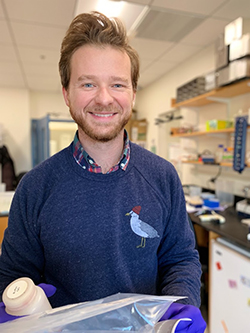 I am grateful the MCB faculty were readily available for advice. My committee members were important resources, and are experts in a huge variety of topics. Because of them, I left Brown with a broad perspective, that is essential for synthesizing important research questions.
I am grateful the MCB faculty were readily available for advice. My committee members were important resources, and are experts in a huge variety of topics. Because of them, I left Brown with a broad perspective, that is essential for synthesizing important research questions.
As a postdoctoral fellow at the Whitehead Institute for Biomedical Research, I am focused on understanding eggs from a cell biological perspective. That is, how is this big, specialized cell created, carefully maintained in the ovary, and then how does it divide many times and while patterning itself into an entirely new animal? I am currently exploring how eggs persist in their arrested state while maintaining their ability to divide in the future.
On what is exciting about his current work.
As a postdoctoral fellow at the Whitehead Institute for Biomedical Research, I am focused on understanding eggs from a cell biological perspective because of their supreme responsibility, and the incredible things they need to accomplish. That is, how is this big, specialized cell created, carefully maintained in the ovary, and then how does it divide many times and while patterning itself into an entirely new animal? I am currently exploring how eggs persist in their arrested state in the ovary while maintaining their ability to divide in the future. In humans, this arrest lasts for decades—a pretty impressive feat.
To address these questions, I have developed the sea star as a model organism for oocyte development. Sea star oocytes undergo transitions remarkably similar to their mammalian counterparts, but offer great experimental tractability. I am also combining my work with comparisons in human cells, which is possible because the laboratory primarily focuses on mammalian tissue culture. For me, using multiple experimental approaches has been both fun and scientifically rewarding.
Before accepting a postdoc position, I was fairly confident I wanted to stay in academia, but actually envisioned a much different path, exploring the evolution of development of sea creatures, possibly at a marine station. I kept the sea creature, but my research has taken a more biomedical turn. I am very happy with this choice, which has enabled me to pursue the fundamental questions that I enjoy, while also having the potential to impact human health.
How Brown shaped his current trajectory
I am grateful the MCB faculty were readily available for advice. My committee members were important resources, and are experts in a huge variety of topics. Because of them, I left Brown with a broad perspective, that is essential for synthesizing important research questions. I also greatly benefitted from my coursework – in particular, a scientific communication class was invaluable preparation for the onslaught of fellowship and grant writing that comes with a first-year postdoctoral experience.
Before coming to Brown for my PhD, I was working as a lab technician in Boston. I was actually questioning whether I was cut out for research. I decided to give it another shot and was thrilled to go back to school in a supportive new environment. Professor of Biology Gary Wessel was, and continues to be, a dedicated mentor who has helped me navigate many aspects of working in science. In addition to the lab in which I worked, the MCB department seminar series was instrumental in identifying my postdoctoral position. In fact, it was because my current mentor gave a talk in this series that I later contacted him and joined his group. The diversity of science in this series was important to me, because without this broad exposure, I would not have started along this path which is quite divergent from my PhD research. It’s difficult to anticipate how a small nudge in one direction can manifest in a big course change only a few years later.
Having now worked in a few different departments, I can say that Brown MCB is a special place. I continually miss the balance one finds at Brown. There is a great intellectual rigor and high quality of research, but also a culture of sincere curiosity, positivity and support for each other that one does not find everywhere.
His path to Brown
I grew up in Connecticut and have spent most of my research life in New England. Since I was young, I have found the natural world—particularly the ocean—to be fascinating and beautiful. My family always spent a lot of time in the forest or at the beach, so my path into biology was fairly natural. I was pleasantly surprised to find out as an undergraduate at the University of Rochester that my appreciation for nature could be combined with cellular and molecular questions in the field of developmental biology. At Brown, I earned my PhD in Professor Wessel’s lab, studying how stem cells that will make eggs and sperm are produced in embryonic development. We used marine animals like sea urchins as our model organisms, which offered the practical benefit of millions of eggs to work with. Reproductive biology has remained my current focus.